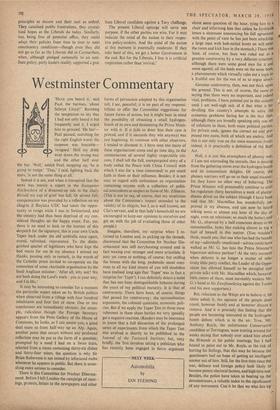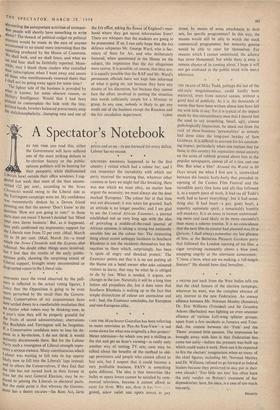Westminster Commentary
Indeed it is not, and when it transpired that the news was merely a report in the Stuttgarter Nachrichten of a dreamed-up tale in the Daily Herald my cup of grief was full. Or almost full; compensation was provided by a reflection on my chagrin if Hoylake UDC had taken the oppor- tunity to resign while I was in Switzerland, and the country had thus been deprived of my con- sidered thoughts on the happy event. For, yes, there is no need to look to the bottom of this despatch for the signature; this is your own Uncle Taper back under the old umbrella once again, rested, refreshed, rejuvenated. To the distin- guished quartet of legiSlators who have kept the bed warm for me in my absence I extend my thanks, pausing only to remark, in the words of the Catholic priest invited to co-operate on the committee of some charitable organisation by the local Anglican minister : 'After all, why not? We are doing the Lord's work : you in your way, and I in His.'
It may be interesting to consider for a moment the particular aspect taken on by British politics when observed from a village with four hundred inhabitants and four feet of snow. One or two conclusions are immediately obvious; for exam- ple, ridiculous though the Foreign Secretary appears from the Press Gallery of the House of Commons, he looks, as I can assure you, a good deal more so from half-way up an Alp. Again, another point that occurs without any profound reflection may be put in the form of a question; prompted by a meal I had on a Swiss train, selected from a menu containing thirty-six dishes and thirty-four wines, the question is why Sir Brian Robertson is not stoned by infuriated mobs whenever he appears in public. But there is some- thing more serious to consider.
There is this Committee for Nuclear Disarma- ment. Before I left London the campaign of meet- ings, protests, letters to the newspapers and other forms of persuasion adopted by this organisation (all, I see, peaceful; it is no part of my responsi- bilities to offer the Committee suggestions for future forms of action, but it might bear in mind the possibility of obtaining a small hydrogen- bomb of its own and threatening the Prime Minis- ter with it. If it fails to deter him their case is proved, and if it succeeds they win anyway) was just beginning. In common with other observers, I tended to discount it; 1 have seen tdo many of these organisations come and go (one day, to the consternation of several highly respectable citi- zens, I shall tell the full, unexpurgated story of a body called the Peace with China Council with which I was for a time concerned) to put much faith in them or their influence. Besides, it is not easy to regard; with enthusiasm an organisation containing anyone with a collection of politi- cal antecedents as, suspect as those of Mr. Zilliacus. (This is not to say, of course, that my scepticism about the Committee's impact extended to the validity of its obj9cts; but I, as is well known, am Clio's servant, and in that lady's household we are encouraged to keep our opinions to ourselves and get on with the job of evaluating those of other people.) Imagine, therefore, my surprise when I re- turned to London and, in picking up the threads, discovered that the Committee for Nuclear Dis- armament was still tarryhooting around and in fact waxing ever stronger and more articulate. It may yet come to nothing, of course; but sniffing the breeze with the long, prehensile snout com- mon to all my kind (many of you will doubtless have realised long ago that 'Taper' was in fact a misprint for 'Tapir'), I can definitely detect a scent that has not been distinguishable hitherto during the years of my political maturity. It is that of controversy. There have been, of course, things that passed for controversy: the nationalisation arguments, the colonial questions, economic poli- cies. But if we apply the Taper Test to those most vehement in these sham battles we very speedily get a negative reaction. (Readers may be interested to know that a full discussion of the prolonged series of experiments from which the Taper. Test was evolved is shortly to be published in the Journal of the Tavistock Institute; but, very briefly, the Test involves taking a politician who has recently been engaged in fierce argument • about some question of the hour, tying him to a chair and informing him that unless he forthwith issues a statement announcing his full agreement with the point of view he has just been attacking, a large man with hob-nailed boots on will enter the room and kick him in the stomach.) There was Suez, of course, but Suez was ruled out as a genuine controversy by a very different criterion; although there were some good men for it and some against, all the heels were on the same boot, a phenomenon which virtually rules out a topic as a fruitful one for the rest of us to argue about.
Genuine controversy, then, was not thick upon the ground. This is not, of course, the same as saying that there were no important, and indeed vital, problems. I have pointed out in this column until I am well-nigh sick of it that what is be- devilling this country's attempts to solve the economic problems facing her is the fact that, although there are broadly speaking only one set of solutions to them, both main political parties, for private ends, ignore the correct set and pro- pound two more, both of which are useless. And this is not only true on the main economic front; indeed, it is practically a definition of the Rent Act.
Well, it is just this atmosphere of phoney war, if I am not misreading the entrails, that is missing from the gathering storm over the hydrogen-bomb and its concomitant delights. Of course, the phoney warriors will go on in their usual manner, for they know no other way of behaving. The Prime Minister will presumably continue to emit his regulation thirty hectolitres a week of platitu- dinous drivel on the subject (though I have been told that Mr. Macmillan has wonderfully im- proved in my absence, and can now be heard talking sense at almost any hour of the day or night, even on television; so much the better) and Mr. G., obsessed by a half-conscious desire to be statesmanlike, looks like making almost as big a fool of himself in this matter. (You wouldn't think, would you, that one who has had the benefit of my—admittedly unsolicited—advice could have walked as Mr. G. has into the Prime Minister's bipartisan defence parlour? At the very moment when defence is no longer a matter of rela- tively little party conflict, the Leader of the Oppo- sition has allowed himself to be inveigled into private talks with Mr. Macmillan which, however little comes of them, must inevitably weaken Mr. G.'s hand in his Zweifrontkrieg against the Tories and his own supporters.) But, reluctant as the Whips are to believe it, let alone admit it, the opinion of the people does count, however feebly and at however distant a remove. And it is precisely this feeling that the people are becoming interested in the hydrogen- bomb debate which is in the air. True, Mr. Anthony Royle, the unfortunate Conservative candidate at Torrington, went trotting around for weeks saying that nobody ever asked him about the H-bomb at his public meetings, but I feel bound to point out to Mr. Royle, at the risk of hurting his feelings, that this may be because the questioners had no hope of getting an intelligent answer out of him. Still, for the first time since the war, defence and foreign policy look likely to become potent electoral factors, and high time too. Besides, the police have taken to beating up the demonstrators, a reliable index to the significance of any movement. Can it be that we who live by chronicling the unimportant activities of unimpor- tant people will shortly have something to write about? The thwack of political cudgel on political cranium would be music in the ears of anyone accustomed to no sound more interesting than the squealing produced by the House of Commons. We shall look, and we shall listen, and what we see and hear shall be faithfully reported. Mean- while, may I thank those readers who cancelled their subscriptions when I went away and assure all those who simultaneously renewed theirs that I shall not be going away again for some time? The lighter side of the business is provided by What is known, for some obscure reason, as Military Intelligence. Would that I had been around to contemplate the lads with the tiny, Pointed heads, bowlers balanced precariously atop the dolichocephalicity, clumping into and out of the Isis office, asking the flower of England's man- hood where they got secret information from! There are whispers that the students are going to be prosecuted. If so, I can only hope that the Isis defence subpoenas Mr. George Ward, who is Sec- retary of State for Air, and who deliberately fostered, when questioned in the House on the subject, the impression that the Isis allegations were untrue. It is possible, of course, that they are; it is equally possible that the RAF and Mr. Ward's permanent officials have not kept him informed of what is going on, not because they have any doubts of his discretion, but because they cannot face the effort involved in putting the situation into words sufficiently simple for a Minister to grasp. In any case, nobody is likely to get any credit out of the business except the Russians and the Isis circulation department. TAPER











































 Previous page
Previous page